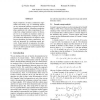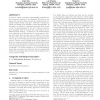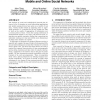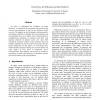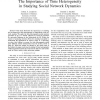241 search results - page 16 / 49 » Understanding Social Networks Using Formal Concept Analysis |
138
Voted
SYRCODIS
2007
15 years 3 months ago
2007
High complexity of lattice construction algorithms and uneasy way of visualising lattices are two important problems connected with the formal concept analysis. Algorithm complexi...
129
Voted
WWW
2006
ACM
16 years 3 months ago
2006
ACM
In order to obtain a machine understandable semantics for web resources, research on the Semantic Web tries to annotate web resources with concepts and relations from explicitly d...
147
click to vote
CCR
2010
15 years 2 months ago
2010
The analysis of social and technological networks has attracted a lot of attention as social networking applications and mobile sensing devices have given us a wealth of real data...
140
Voted
ASUNAM
2009
IEEE
15 years 9 months ago
2009
IEEE
In order to understand the evolution of online identities, we measured the correlation between past and current representations of self on the MySpace social network. We applied s...
158
Voted
HICSS
2011
IEEE
14 years 6 months ago
2011
IEEE
—This study illustrates the importance of assessing and accounting for time heterogeneity in longitudinal social network analysis. We apply the time heterogeneity model selection...
